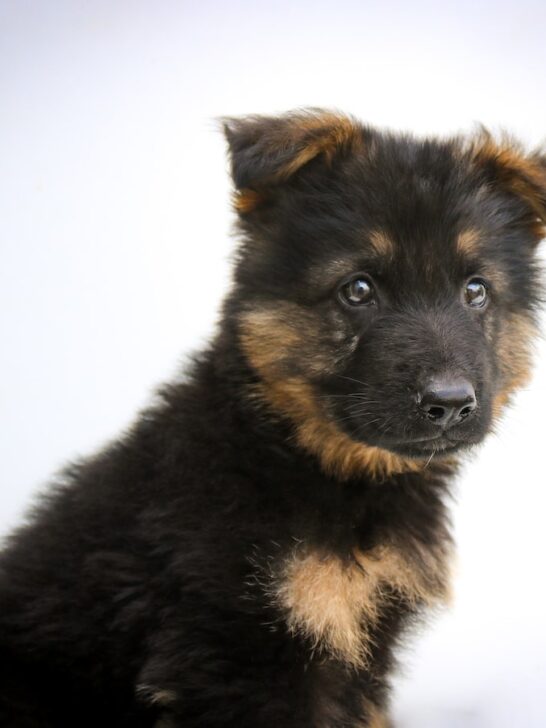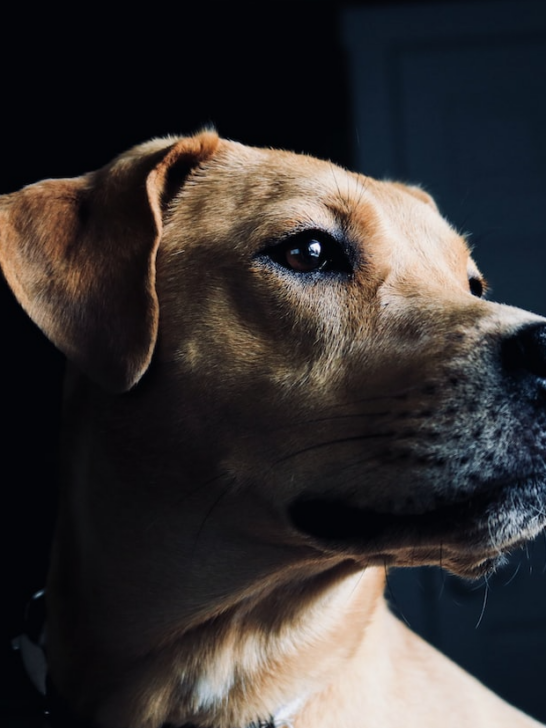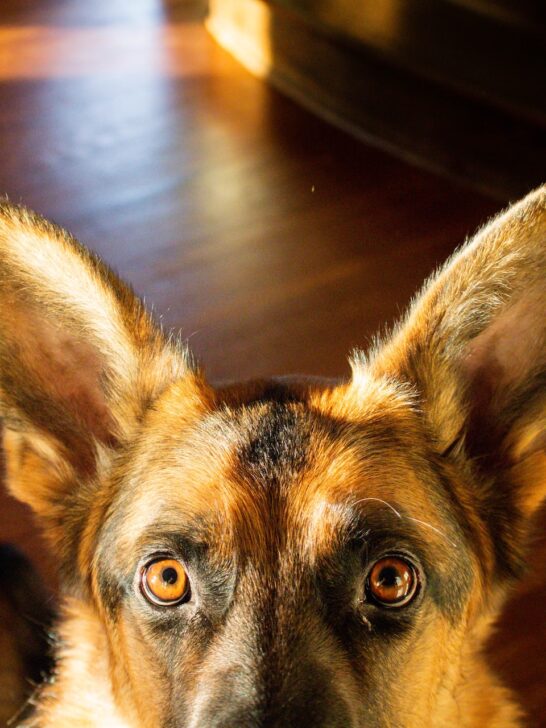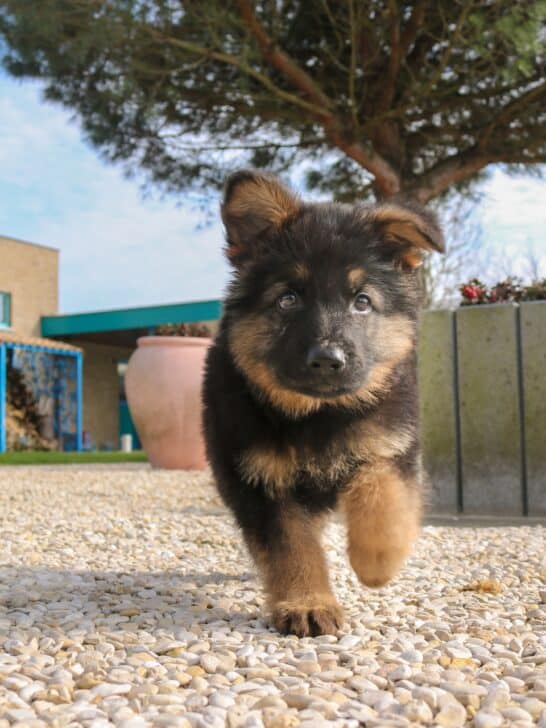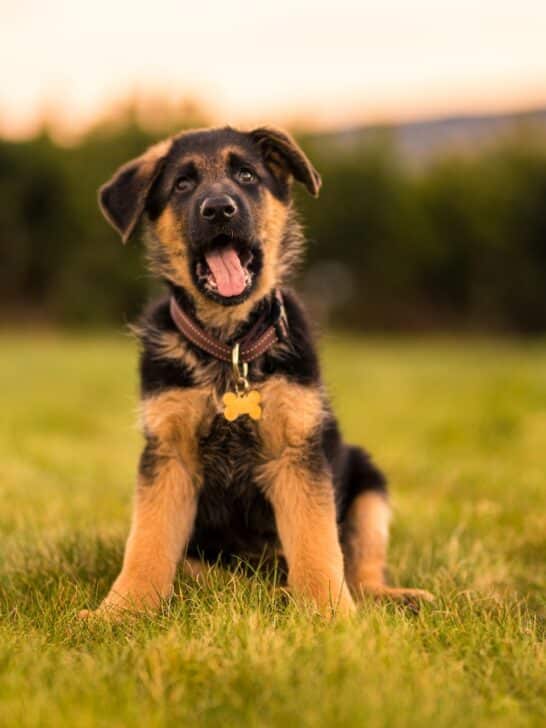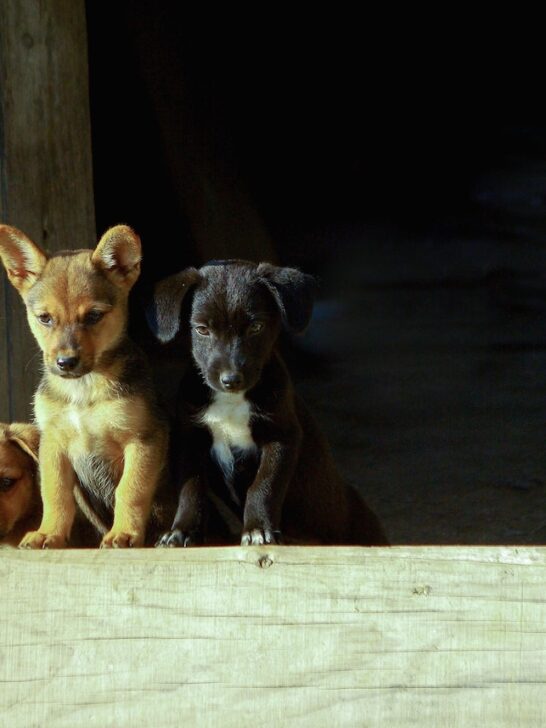Why My Puppy Won’t Poop Outside and What Can I Do About It?
Potty training a puppy can be an exercise that demonstrates both your frustration and patience, especially if they seem to “deliberately” be doing the wrong thing—like holding their poop and then going in the house.
Most 12-week-old pups are ready for a potty training marathon, or soon will be. Before this point, they can’t control their bowel movements very much, and won’t be able to tell when to cork it and when it’s ok to go.
Your puppy is never doing it to be spiteful—there’s likely a solid reason for their behavior and they need you to “listen” to what’s happening, instead of just getting angry.
Obviously, you need to address the behavior, but being mean or yelling is simply going to make potty training harder, as you’ll frighten them. Instead, take a deep breath and let our helpful guide assist you.
We’ve rounded up the best advice and tips to help you through this difficult phase. And remember, even an older pup is still a baby and can have accidents.
Reasons Why Dogs Don’t Poop Outside
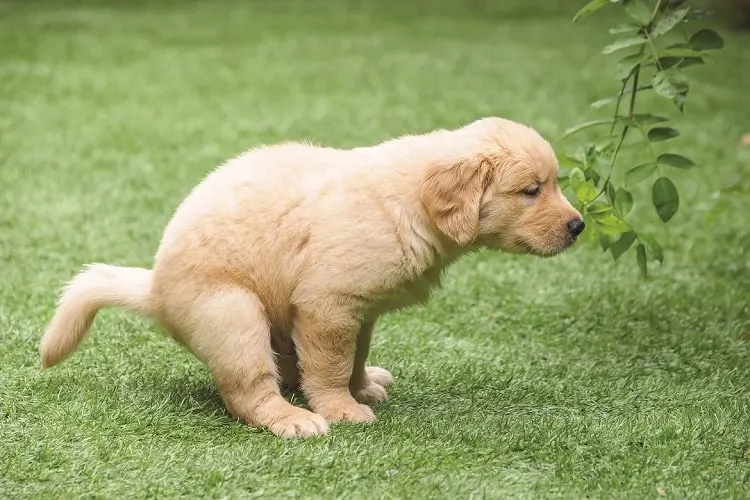
Firstly, let’s look at why your pup may be pooping in the house rather than outside. Correcting the behavior will be much easier if you can nail down a solid reason.
Remember, though, if your newest family member is still under 12 weeks old, then that’s likely the reason why they keep going inside. However, for pet parents of older puppies, there are several key reasons that you should know about if you’re still struggling to get your pup to poop appropriately.
Medical Problems
This should be every new pet owner’s first stop when “bad” behavior happens—is there something physically wrong? When puppies are under the weather, they frequently poop as their bodies try to heal. Plus, of course, they can get diarrhea too.
Ensure the puppy has no gastrointestinal issues, like worms or other parasites. This can make them unable to hold in their feces, and their accidents will be frequent.
Likewise, older or injured dogs may be in too much pain to squat to poop. It’s unusual for healthy puppies to have joint issues (or arthritis), but it’s always a possibility.
If your doggie is sick, sore, and hurting, they’re going to try to hold onto their poop until the last minute—and it’s common for it to come too late to do anything but go where they are.
So, start with a solid vet check if you’re having persistent potty training issues. Sometimes animals can look well even when they are hurt.
Watch out for runny or weirdly hard/crumbly stools, foreign bodies or blood in the poop, shaking and crying while the dog tries to defecate, and other signs that something isn’t right. It could be serious, or may simply be from a change in diet.
Not Potty Trained
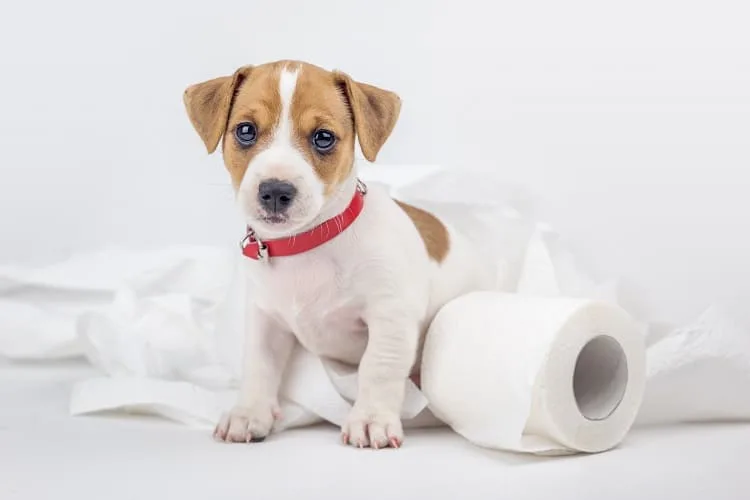
A puppy is still a baby dog, and some regression in potty training can happen. Or maybe the pup wasn’t as ready as you thought they were. You can only call your dog completely housebroken when you’ve gone about six months accident-free.
If you’re only a few weeks into that process and there’s an accident, you may have set your expectations a bit high.
It’s also common for people to become lax when they’re deep into potty training. Make sure that you’re still praising your pup when they poop correctly, that you go out on a regular schedule, and that you stick to the routine.
Don’t stretch the time between potty breaks—puppies only have small bladders, and they need plenty of chance to do the right thing.
If your pup is prone to peeing outside, then immediately pooping indoors, try keeping them leashed post-potty break.
This way, you can monitor them, and take them outside immediately if there are any signs of something brewing. Otherwise, try again in 20 minutes, and keep trying until they succeed.
Wrong Surface Texture
Yup, some dogs are this fussy! Sometimes, it’s linked to a physical trigger—such as having been taught as a young pup to go on newspapers, and not knowing that dirt and grass are also allowed.
This can also be a problem when you take older dogs home who have been in a run all their lives.
If you notice that your dog has a preferred surface, let them go there, be it gravel, concrete, or other terrains. It is easier to meet their needs on this one than to try and train them out of it.
If they seem to be leaning toward the carpet, as gross as it will be temporarily, you can pick up a cheap offcut piece and place it outside to help retrain them. Just be careful if you have other pets and kids!
Weather can affect dogs too. Some dogs hate the hot or cold, and some don’t like wet feet.
There’s not a lot to be done about this one, but think of comfort items like jackets and booties, or tarp off an area so it stays drier in wet weather.
You Are Mean
It’s frustrating to have a dog sully the house, we get it—but if you rant and rave at them over it, you’re just making it worse. Remember, most dogs have the emotional intelligence of a 2 to 4-year-old and need the same understanding and patience.
Dogs aren’t geniuses (even smart breeds like the German Shepherd) and will start to associate pooping in front of you as the issue, not the idea of it being in the home. This teaches them to be sneaky and scared, not to do better.
Instead, focus on positive reinforcement when things go right. Hype the praise and excitement when they do good, and they’ll start actively seeking it and understanding the desired action.
Not Calm Enough
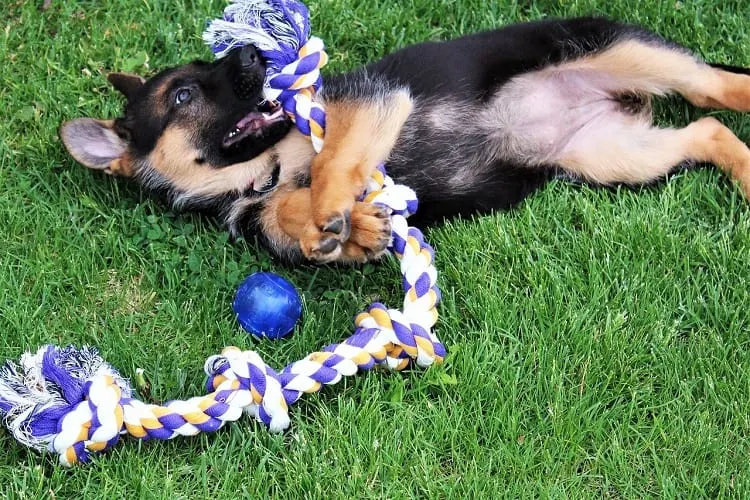
Dogs have emotions too, and just like young children, dogs can get overwhelmed. For a dog, the outside is a haven of delicious and exciting things to smell, and they may associate it with the fun of walks.
They can be too distracted to go and want to watch all the fun stuff instead. This is why it’s wise to have a dedicated “potty corner” of the garden, so they start associating being there with going. Don’t forget the treats and praise when they do go!
Oddly, if a dog has gotten in the habit of pooping at the end of a walk, they can start associating going with the end of the fun—and put it off as long as possible so they can enjoy themselves more.
It may be worth trying to get them to poop before a walk, so it becomes the start of the fun time, not the end of it.
However, some dogs get nervous and anxious going outside, especially if they’ve recently been frightened or attacked. If you notice low ears, tucked tails and hunched shoulders they most likely want to flee inside, rather than perform.
Sometimes, you might not know the cause of the scare—look for things that could be triggering it. Other animals, holiday decor, things blowing in the wind, strange noises, or raucous neighbors could trigger their nerves.
Or, they may simply always have been nervous, and need some desensitization, patience, and positivity to relax. Again, treats and praise are the way to go.
Let them know they’re doing the right thing by being outside. Start with small outdoor breaks that aren’t associated with pottying, and then start refocusing on potty training once they’re more comfortable with the outside world.
Schedule Changes
Do you know that many of your good habits go by the wayside when you get stressed? Dogs aren’t people, but they do understand the confusion, stress, and routine changes.
This kind of upset—even something as simple as you working changeable shifts and changing potty time—can throw them off their pooping game. It may take them time to calm down and adapt.
If at all possible, adjust potty break times slowly, in 15-minute increments. This will help with a fuss-free adaptation. And if the family is having a rough patch, or you’ve brought home a new pet (or a baby), give the dog time to adapt.
How to Encourage Your Puppy to Poop Outside
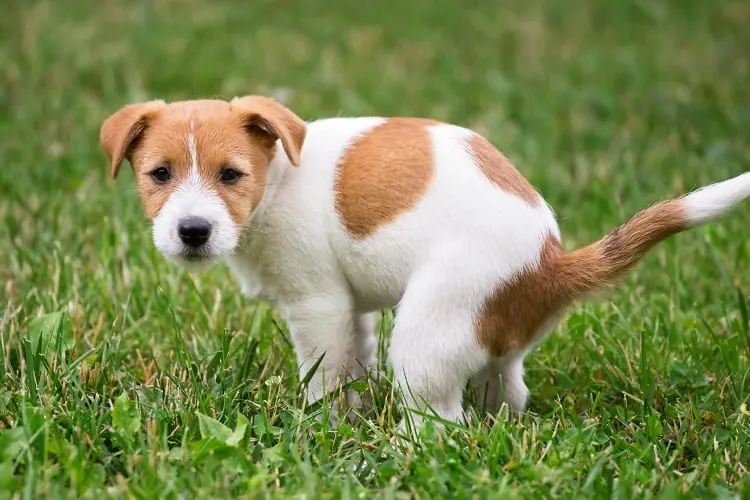
We’ve looked at some strategies for each situation above, so we’re sure you already feel more empowered about your puppy not pooping outside.
Hopefully, you also understand that your dog isn’t trying to be bad deliberately, but that something is bothering them. We cannot overstate the importance of calm behavior and positive reinforcement.
You can use the leash trick we mentioned above to help adjust a stubborn inside-pooper, and keeping an eagle eye on your young dog and popping them outside if you see poop coming on will help too.
You can also use an “interruption” command—something sharp and noteworthy, like a strong, “Uh-uh” or “Ack”, to stop them in their tracks and redirect them.
Make sure you’re giving a clear and calm potty command when you reach the location too, or they may think they’re just going on an outdoor adventure.
If you miss a stealthy inside poop, there’s nothing you can do but clean it up with an enzymatic cleaner and try better next time.
Dogs don’t have the mental capacity or memory to associate scoldings that are hours after an incident; you’ll just make them scared of you.
Conclusion
It’s frustrating to deal with inside accidents, but a calm, understanding demeanor, positive reinforcement of good behavior, and searching out the underlying cause will soon have your puppy back on track with their outdoor pooping.
FAQ:
1. Why is my puppy still pooping inside even though I’ve been potty training them?
Answer: There are a few reasons why this may be happening. Firstly, if your puppy is under 12 weeks old, they may not have full control of their bowel movements yet. Additionally, there may be medical issues such as gastrointestinal problems or pain that are preventing them from holding their poop. It’s also possible that your puppy has regressed in their potty training or has a preference for a certain surface texture.
2. How can I tell if my puppy has a medical issue that’s causing them to poop inside?
Answer: Watch out for signs such as runny or crumbly stools, foreign bodies or blood in the poop, shaking and crying while attempting to defecate, and changes in diet. If you suspect that your puppy may have a medical condition, it’s best to take them to the vet for a check-up.
3. Will yelling at my puppy for pooping inside help with potty training?
Answer: No, yelling or being mean to your puppy will only make potty training harder as they will become frightened. Instead, focus on positive reinforcement when they do the right thing by hyping the praise and excitement.
4. Can weather affect my puppy’s ability to poop outside?
Answer: Yes, some dogs may not like extreme temperatures, wet feet, or windy conditions. Consider comfort items such as jackets or booties, or try to find a dry area outside for your puppy to go.
5. How can I encourage my puppy to poop outside?
Answer: Try to maintain a regular schedule for potty breaks, praise and reward them when they go outside, and use an “interruption” command such as “Uh-uh” to redirect them if needed. Additionally, keep an eye on them and take them outside immediately if you see any signs of them needing to go.














